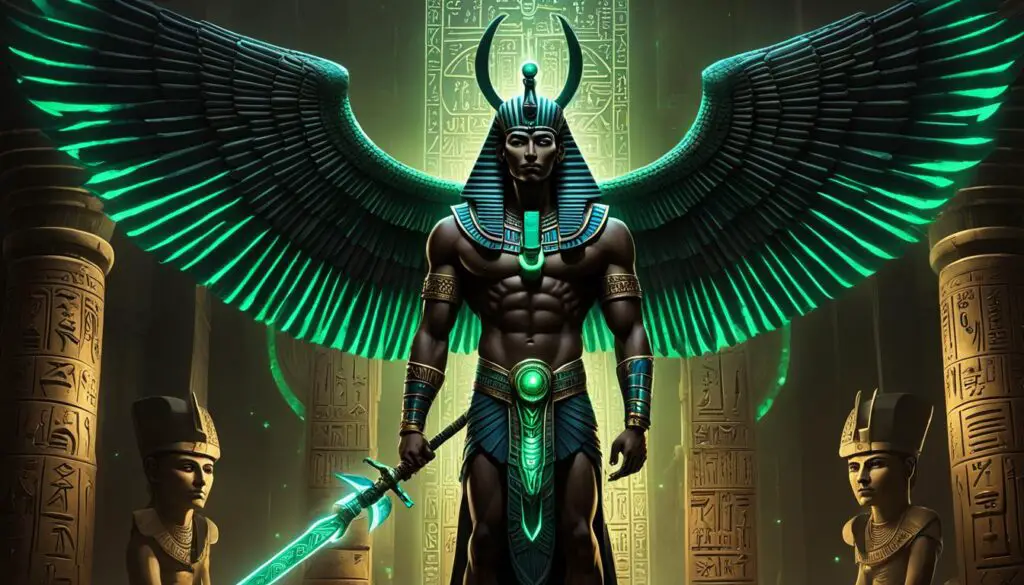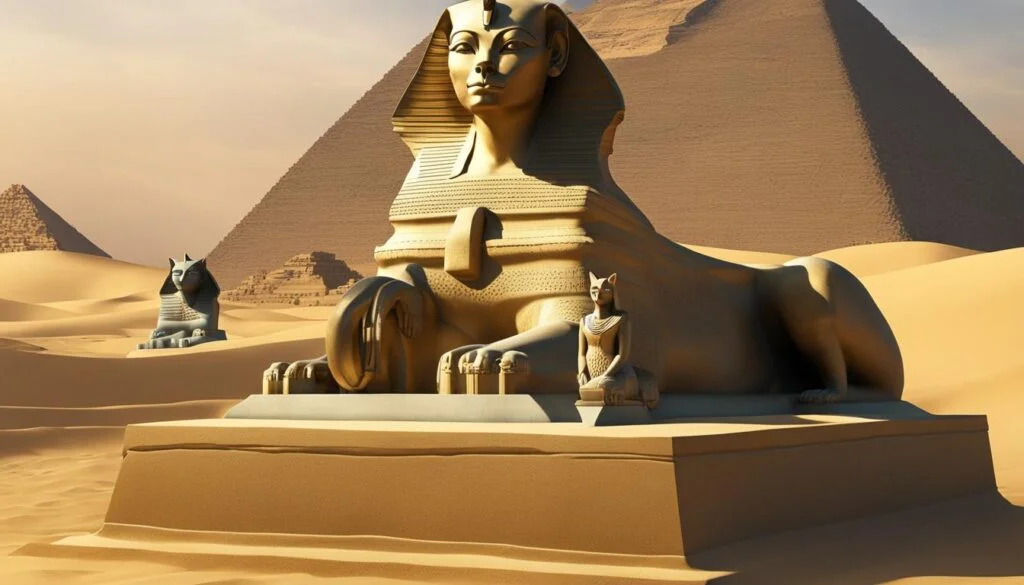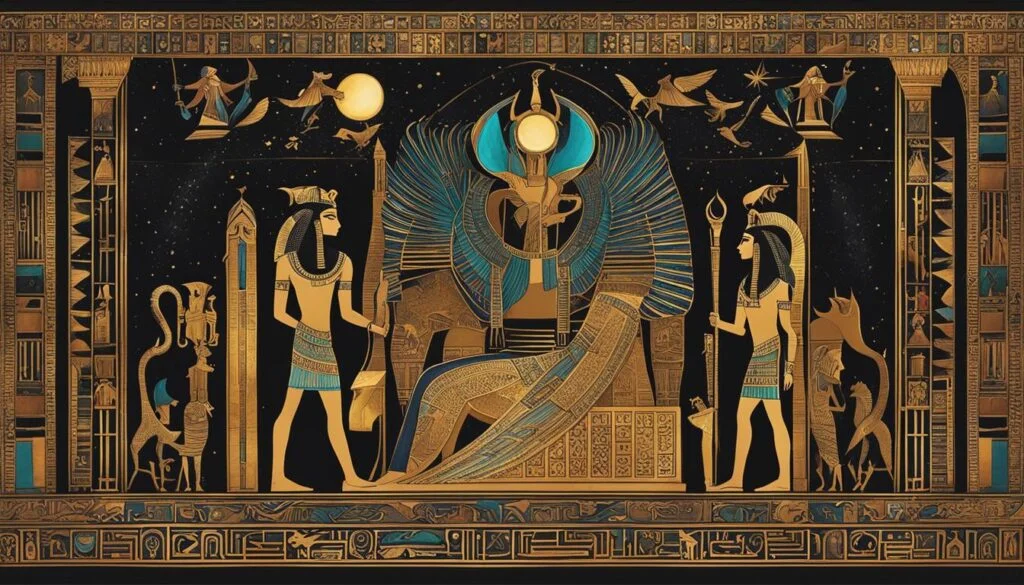Are you curious about which Egyptian god guards the underworld? Look no further than Anubis, the ancient Egyptian god of the underworld. Anubis is a fascinating deity associated with funerary rites, the protection of graves, and guiding souls into the afterlife.
Key Takeaways:
- Anubis is the Egyptian god who guards the underworld in ancient Egyptian mythology.
- He is associated with funerary rites, the protection of graves, and guiding souls into the afterlife.
- Anubis played a significant role in the weighing of the heart ceremony to determine the fate of the deceased in the afterlife.
- His depictions often show him as a canine or a man with a canine head.
- His symbols include mummy gauze, fetish, the flail, and the jackal.
The Role of Anubis in Ancient Egyptian Religion
Anubis, the ancient Egyptian god of death and the afterlife, played a crucial role in the religious beliefs of the ancient Egyptians. As the guardian of the underworld, Anubis was responsible for ensuring the safe passage of the deceased into the realm of the dead. But his role was not limited to just that.
In early Egyptian mythology, Anubis was commonly believed to be the son of Ra, the sun god. However, as the religious beliefs evolved, Anubis took on different parentage. In the Coffin Texts, he was depicted as the son of the cow goddess Hesat or the cat-headed Bastet. This transformation showcases the fluidity of Egyptian mythology and the different interpretations associated with Anubis.
One of Anubis’ important roles was his association with mummification. He was often depicted embalming the deceased, a process that was crucial in preserving the body for the afterlife. Anubis’ involvement in this ritual highlights his connection to the underworld and the journey of the soul beyond death.
During the Middle Kingdom, Anubis was gradually replaced by Osiris as the lord of the underworld. However, this transition did not diminish Anubis’ significance. He continued to play a role as a guide for souls and participated in the judgment of the deceased. His presence ensured that the souls found their rightful place in the afterlife.
Overall, Anubis held a prominent position in ancient Egyptian religion as the underworld guardian and the god of death and the afterlife. His multifaceted role as a protector, embalmer, and guide exemplifies the complexity and symbolism associated with his representation. Anubis remains an intriguing figure in Egyptian mythology, captivating the imagination of scholars and enthusiasts alike.
Depiction and Symbolism of Anubis
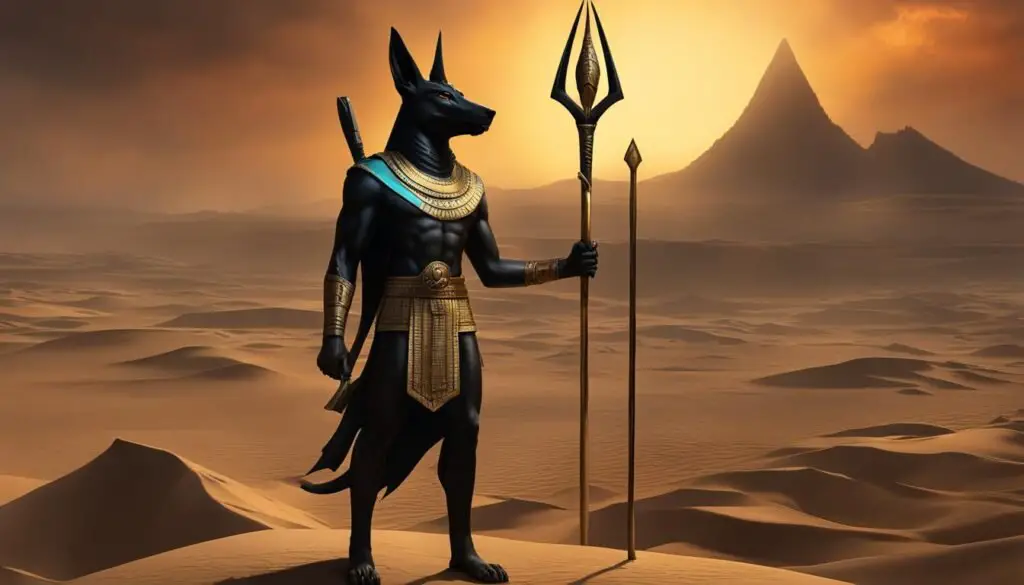
Anubis, the ancient Egyptian god of the underworld, is commonly depicted as a black figure representing the regenerative powers of death and the fertile soil of the Nile River. His portrayal often includes a jackal’s head or the form of a jackal, symbolizing his connection with the wild and mysterious nature of the afterlife.
Historians believe that Anubis may have been combined with another canine deity, Wepwawet, who was associated with the idea of opening the way and had grey or white fur. This amalgamation further reinforced Anubis’ role as the guardian and guide through the underworld.
As in many ancient mythologies, Anubis also has a female counterpart, Anput, and the serpent goddess Kebechet is considered their daughter. These divine connections illustrate the complex interplay of life, death, and rebirth in ancient Egyptian beliefs.
Anubis is often depicted holding symbols associated with the afterlife, such as mummy gauze, fetish, the flail, and the jackal. These objects further emphasize his responsibilities as the protector of graves and the guide of souls into the afterlife.
Anubis’ Name and Titles
In ancient Egyptian mythology, Anubis is known by various names and titles that reflect his significance as the guardian of the Egyptian underworld and the god of the underworld. His Egyptian name was Anpu or Inpu before the Greeks arrived in Egypt. The root of his name in ancient Egyptian means “a royal child” and is associated with the concept of decay. Anubis is also referred to by many titles, including:
- “First of the Westerners”: Highlighting his prominence and authority in the land of the dead.
- “Lord of the Sacred Land”: Emphasizing his divine rule over the realm of the afterlife.
- “He Who is Upon his Sacred Mountain”: Symbolizing his close connection to the sacred mountains that were considered to be gateways to the underworld.
- “Ruler of the Nine Bows”: Signifying his dominion over all the regions of Egypt.
- “The Dog who Swallows Millions”: Depicting Anubis as a powerful deity capable of consuming countless souls.
- “Master of Secrets”: Indicating his role as the guardian of knowledge and rituals associated with the afterlife.
- “He Who is in the Place of Embalming”: Illustrating his association with the embalming process and preserving the deceased.
- “Foremost of the Divine Booth”: Suggesting his status as the primary deity in charge of the ritual structures associated with mummification and the afterlife.
Each of these names and titles provides insight into the multifaceted nature of Anubis and his duties in Egyptian mythology.
Anubis and the Afterlife Journey
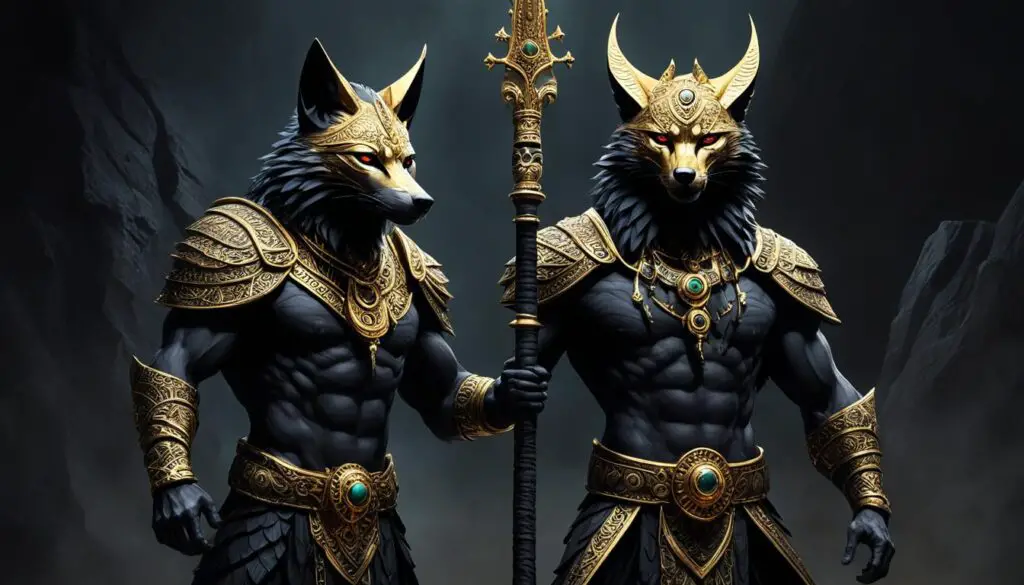
Anubis, the Egyptian god who guards the underworld, played a crucial role in the afterlife journey of the deceased in ancient Egyptian belief. As the guide to the realm of the dead, Anubis ensured the safe passage of souls through the underworld.
During the afterlife journey, Anubis attended the weighing of the heart ceremony, a significant event in Egyptian mythology. In this ceremony, the heart of the deceased was weighed against the feather of Ma’at, the goddess of truth and justice. Anubis ensured that the judgment was fair and that the souls were treated justly based on their deeds in life.
Furthermore, Anubis protected the deceased’s body during the mummification process, ensuring that it was preserved for the afterlife. He watched over their tomb, ensuring the souls found their final resting place, and safeguarded their eternal peace.
Anubis, as the guardian of the underworld, held immense responsibility in guiding the souls and ensuring their proper judgment. His presence throughout the afterlife journey provided reassurance and assistance to the deceased as they transitioned into the next realm.
Image: An image depicting Anubis, the Egyptian god who guards the underworld.
Anubis in Greek and Roman Mythology
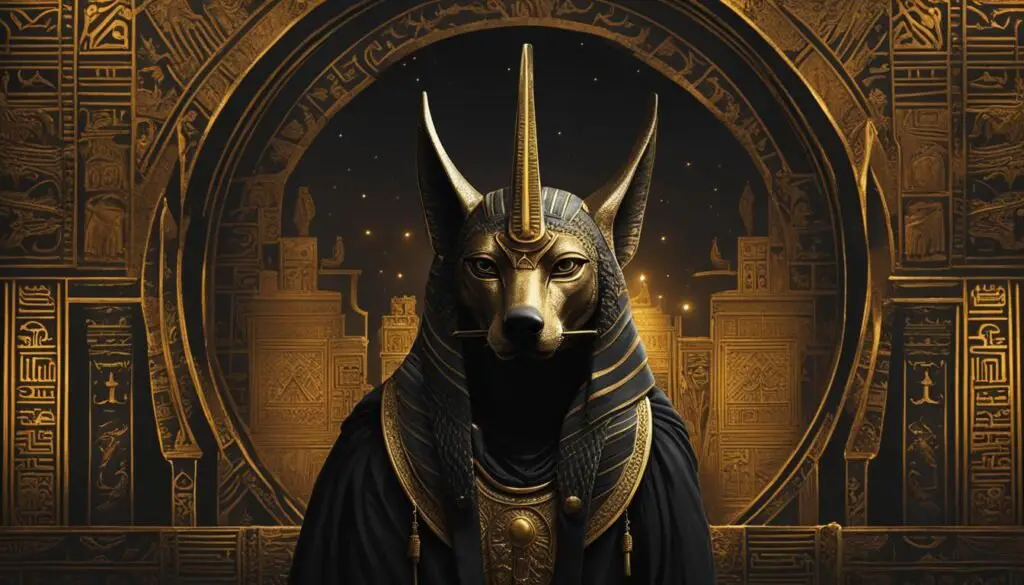
In the Hellenistic period, Anubis, the ancient Egyptian underworld god, was merged with the Greek god Hermes, becoming Hermanubis. This fusion was a result of the similarities between the two deities, as both guided souls to the afterlife.
During Roman times, Anubis was often associated with Sirius in the heavens and with Cerberus and Hades in the underworld. Despite the initial ridicule by the Greeks towards the Egyptian animal-headed gods, Anubis gained recognition and respect in Greek and Roman mythology.
Anubis, the Egyptian god of the underworld, even found his way into the dialogues of Socrates, where he was invoked as an arbiter of truth in the realm of the dead.
Conclusion
Anubis, the Egyptian god who guards the underworld, holds a significant place in ancient Egyptian mythology. As the protector of graves, guide to the afterlife, and judge of the deceased, he played a crucial role in the journey of the soul in the afterlife.
Anubis’ symbolism, names, and titles reflect his importance in Egyptian culture. He is commonly depicted as a black figure, often shown with a jackal’s head or in the form of a jackal, symbolizing the regenerative powers of death and the fertile soil of the Nile River. His various names and titles, such as “First of the Westerners” and “Ruler of the Nine Bows,” highlight his different roles and positions in Egyptian mythology.
Despite being merged with other gods in later periods, Anubis remained an essential figure in the mythology of both ancient Egypt and the Greco-Roman world. His role as the guardian of the underworld continues to fascinate and intrigue scholars and enthusiasts of ancient Egyptian mythology, serving as a testament to his enduring significance.
FAQ
What is the Egyptian god who guards the underworld?
The Egyptian god who guards the underworld is Anubis.
What role did Anubis play in ancient Egyptian religion?
Anubis played a significant role in ancient Egyptian religion as the protector of graves and cemeteries, the guide to the afterlife, and the judge of the deceased.
How is Anubis depicted and what symbolism is associated with him?
Anubis is often depicted as a black figure with a jackal’s head or in the form of a jackal. His symbolism includes the regenerative powers of death and the fertile soil of the Nile River.
What are the names and titles of Anubis in ancient Egyptian mythology?
Anubis has various names and titles, including Inpu, Inpw, Jnpw, Anpu, “First of the Westerners,” “Lord of the Sacred Land,” “He Who is Upon his Sacred Mountain,” “Ruler of the Nine Bows,” “The Dog who Swallows Millions,” “Master of Secrets,” “He Who is in the Place of Embalming,” and “Foremost of the Divine Booth.”
What was Anubis’ role in the afterlife journey of the deceased?
Anubis guided the souls of the dead through the underworld, ensured their safe passage to the realm of the dead, and participated in the weighing of the heart ceremony to determine their fate in the afterlife.
How is Anubis portrayed in Greek and Roman mythology?
In the Hellenistic period, Anubis was merged with the Greek god Hermes, becoming Hermanubis. In Roman times, he was often associated with Sirius in the heavens and with Cerberus and Hades in the underworld.


